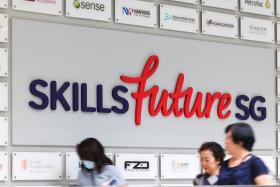Private-hire car operators to be licensed
New law will take effect next year; operators will have to meet safety requirements similar to those for taxis
Six years after ride-hailing first took off here, private-hire car operators will now be licensed under a new law passed by Parliament yesterday, and they will need to meet safety requirements similar to those for taxis.
Taking effect in June next year, the licensing scheme will differentiate operators by the services provided, rather than vehicle type.
Operators can apply for two licenses next February - one for street-hails, where drivers look for passengers to pick up, and another for ride-hails, where the ride is booked in advance.
Opening the debate on the Point-to-Point (P2P) Passenger Transport Industry Bill, Senior Minister of State for Transport Janil Puthucheary said the new law seeks to regulate the operators, with vocational licensing for drivers already in place.
Since ride-hailing platforms first arrived here in 2013, the commuter experience has significantly improved, Dr Janil said.
About 6 per cent of all journeys are completed on taxis or private-hire cars, and of these 276 million trips, more than two-thirds were ride-hails.
But Dr Janil warned that the benefits of P2P transport can be easily lost without sufficient regulatory oversight.
For example, operators could compromise safety at the expense of profits, or lock drivers into exclusive contracts, affecting market contestability and raising prices.
"The (new) framework aims to protect the safety and interests of commuters and drivers, while facilitating an open and innovative P2P sector," he said.
Under the regime:
- Only operators with more than 800 vehicles need to be licensed. Smaller operators are exempt but have to meet basic safety standards.
- Operators providing both street-hailing and ride-hailing need to hold separate licenses.
- Carpool operators will be given a sub-class of ride-hail licenses.
- Operators can be sanctioned if their drivers commit too many accidents or offences.
- All private-hire cars will need to go for annual vehicle inspections.
- Exclusive arrangements preventing drivers from switching platforms will be prohibited.
- LTA will adopt a light regulatory approach towards service standards, and will remove taxi availability standards.
- Licensed operators need to provide LTA with trip and driver-related data.
- LTA can also issue codes of practice for licensees.
- The Public Transport Council will have powers to ensure that fares are clear, and for flat fares, provided upfront.
- Fare evasion and overcharging offences will be extended to private-hire car trips.
Both Grab and Go-Jek were supportive of the Bill's intention to protect commuters and keep the market open.
"Gojek is committed to a long-term presence in Singapore and we look forward to working closely with the Government to shape the future of the industry," said its spokesman.
Grab said it will continue to advocate for child-seat requirements in all vehicles.
It also called on LTA to address the issue of taxi operators restricting drivers from taking fixed-fare jobs on other platforms as soon as possible.
No intention to set caps or regulate private-hire fares: Janil
While the Public Transport Council (PTC) has been given power to oversee private-hire car fares, it will not regulate fare levels, set caps or provide fare algorithms, Senior Minister of State for Transport Janil Puthucheary told Parliament.
A new licensing regime for private-hire car operators will take effect from June next year after the Point-to-Point (P2P) Passenger Transport Industry Bill was passed yesterday.
The PTC Act was also amended to give the council powers to ensure fares are clear and transparent.
But in response to MPs who called for limits on surge pricing, Dr Janil said fare levels are best left to market forces.
"Many of the advantages and benefits that we have seen over the last few years... have come about precisely because the fares have been allowed to work as an efficient resource matching mechanism," he said.
ISSUES
Eleven MPs debated the new P2P sector law, raising issues such as driver income and welfare, market competition, and safety.
A point of contention was the different age requirements for private-hire drivers - who need to hold a driving licence for only two years - and cabbies, who need to be at least 30 years old.
Mr Yee Chia Hsing (Chua Chu Kang GRC) said age, maturity and actual driving experience are key factors in accidents and asked for private-hire drivers to be at least 25 years old.
But Dr Janil said there is no data to suggest that younger private-hire car drivers are more dangerous.
Addressing concerns from Workers' Party Non-Constituency MP Dennis Tan about an increase in road accidents, Dr Janil said the normalised accident rate of private-hire car drivers was six for every 10 million km travelled, only slightly higher than the five taxi accidents for every 10 million km.
There was also debate over the requirement to have a child seat when ferrying children below 1.35m in height, from which taxis are exempt.
Dr Janil said commuters, operators and drivers were all divided on the issue and they could not engineer a compromise before the Bill was tabled.
"The argument can be made that (child seats) need to be more widely available... I actually personally agree. The question is how to make sure that is something the industry can carry and the market can support...
"The matter is live, we continue the conversation, we (will) study the matter further."
- KOK YUFENG
Get The New Paper on your phone with the free TNP app. Download from the Apple App Store or Google Play Store now




